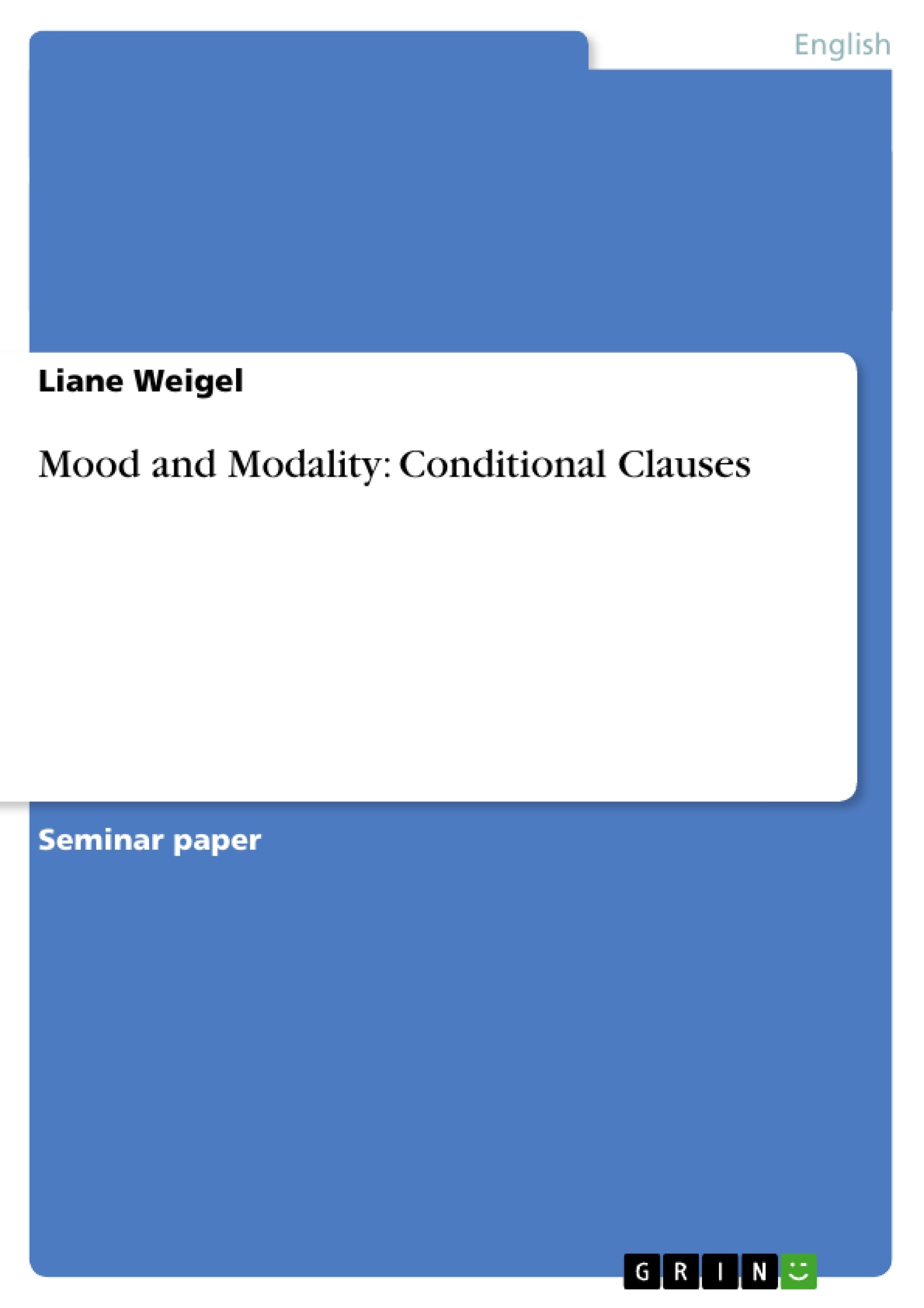When Frank Jackson in the introductory passage of “Conditionals” questions the theory of conditionals the answer is given with “ there is no theory of conditionals which has won general acceptance. Instead there are a number of competing theories” (Jackson, 1991: 3). The following pages of the book present such competing theories, all searching for the logic in conditional clauses. However the understanding of conditional clauses in languages, e.g. in the English language, can be very difficult regarding to the different types and their functions. One the one hand functional Grammar declares the facts of grammar, which are connected with conditional clauses but the main focus is on its usage and the function. Therefore this dissertation investigates mood and modality, which can be expressed by conditional clauses but is also connected with modal verbs, first in a declarative and secondly in an analysing way in order to find out, what the importance especially of conditional clauses and modal verbs for the language is. In the first part after this introduction, modal verbs as the core notions of modality are presented regarding their meaning and importance to express mood and modality, judgements and attitudes. The next part presents an attempt of understanding the complex theory of conditional clauses as a basis for analysing an academic text. An analysis of how modality, judgements and attitudes are expressed in an academic text follows in the next part focusing on the use of conditional clauses. Although the theory and use of conditional clauses with reference to mood and modality are not exhausted with this dissertation, the last part tries to summarize how mood and modality, judgements and attitudes of speakers can be expressed with the help of conditionals.
Inhaltsverzeichnis (Table of Contents)
- 1. Introduction
- 2. Mood and Modality: Modal Verbs - The Core Notions of Modality
- 3. Conditionals
- 3.1. General Ideas
- 3.2. Real Conditions
- 3.3. Unreal Conditions
- 4. Modality in an Academic Text - Analysis of Conditional Clauses in Text 6: “Mood and Modality: Basic Principles” by F.R. Palmer
- 5. Summary
- 6. References
Zielsetzung und Themenschwerpunkte (Objectives and Key Themes)
This dissertation investigates the relationship between mood and modality, particularly focusing on conditional clauses. The goal is to examine the function of conditional clauses in expressing modality, judgments, and attitudes within the framework of functional grammar. This analysis seeks to shed light on the significance of conditional clauses and modal verbs in shaping the English language.
- The nature of mood and modality, particularly as expressed through modal verbs
- The theory and usage of conditional clauses, including real and unreal conditions
- The interplay between mood, modality, and tense in conditional clauses
- The role of conditional clauses in expressing judgments and attitudes within academic texts
- The significance of conditional clauses in shaping the overall meaning and function of sentences.
Zusammenfassung der Kapitel (Chapter Summaries)
The introductory chapter outlines the dissertation's objectives and scope, emphasizing the complexity of conditional clauses and the lack of a universally accepted theory. The chapter also introduces the concept of mood and modality and highlights their connection to the expression of judgments and attitudes. Chapter 2 delves into the core notions of modality, focusing on modal verbs and their role in expressing various types of modality, including epistemic, deontic, and dynamic. It examines the usage of modal verbs like "may," "must," "will," and "can" in conveying different attitudes and judgments. Chapter 3 introduces the concept of conditional clauses, exploring their structure and function as a means of expressing hypotheses or conditions. It also introduces the distinction between real and unreal conditions, highlighting the role of tense and modality in their expression.
Schlüsselwörter (Keywords)
The main keywords and focus topics include: mood, modality, conditional clauses, modal verbs, real conditions, unreal conditions, epistemic modality, deontic modality, dynamic modality, functional grammar, judgments, attitudes, academic texts, and linguistic analysis. The dissertation examines how these concepts interact and shape the structure and meaning of English sentences, particularly focusing on the role of conditional clauses in expressing various types of modality, judgments, and attitudes.
Frequently Asked Questions
What is the main objective of this dissertation?
The study investigates the relationship between mood and modality, specifically focusing on how conditional clauses express these concepts in the English language.
What are considered the "core notions" of modality in this text?
Modal verbs are identified as the core notions of modality, used to express judgments, attitudes, and different types of modality such as epistemic and deontic.
What types of conditional clauses are analyzed?
The dissertation categorizes and analyzes both real conditions (factual or likely) and unreal conditions (hypothetical or counterfactual).
Which academic text serves as the basis for the analysis?
The dissertation performs a linguistic analysis of conditional clauses in the text "Mood and Modality: Basic Principles" by F.R. Palmer.
How does the study approach the theory of conditionals?
It acknowledges that there is no single accepted theory of conditionals but uses functional grammar to examine their usage and function in shaping meaning.
- Arbeit zitieren
- Liane Weigel (Autor:in), 2002, Mood and Modality: Conditional Clauses, München, GRIN Verlag, https://www.grin.com/document/37602



